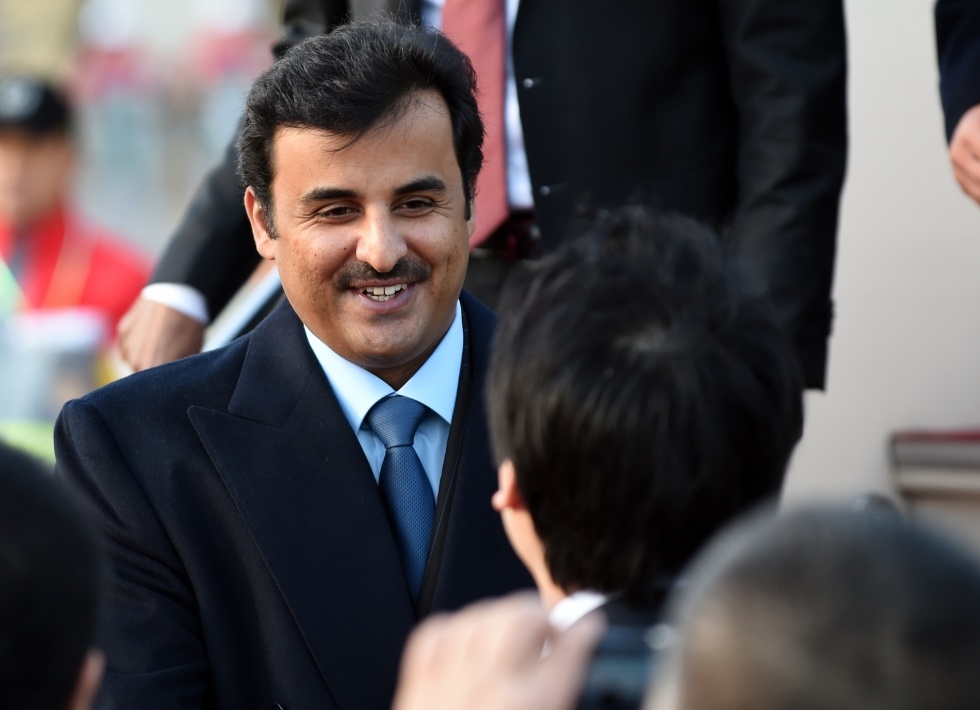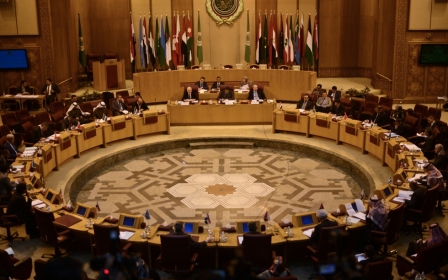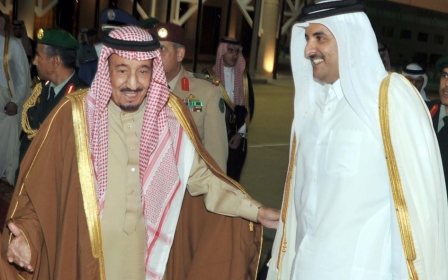Qatar emir to meet Obama amid accusations of religious incitement

The ruler of Qatar will call on US President Barack Obama to work together with the Gulf state “to pull the Middle East back from the brink of collapse” when the two rulers meet on Tuesday in Washington DC, the emir said.
Sheikh Tamim bin Hamad al-Thani’s visit to the White House is his first since becoming ruler of Qatar in June 2013. Obama announced the meeting by saying the two men will discuss “political, economic and security issues of mutual concern”.
Writing in the New York Times prior to his meeting with Obama, Sheikh Tamim said that the world must work together to “rein in the forces of instability and violence”.
Qatar and the US are allies – Doha plays host to a large American military base – and there is $7bn worth of annual bilateral trade between the two countries. However, some in the US have accused Qatar of backing militant groups across the region, and conversations on security issues may prove fractious between Sheikh Tamim and President Obama.
“There is a very frank discussion that needs to be had,” Michael Stephens, head of the Royal United Services Institute for Defence and Security Studies (RUSI) Qatar told AFP.
“There is opinion, particularly on the right of the spectrum (in the US) that Qatar is public enemy number one and Qatar hasn’t done a particularly good job of defending itself.”
It has been alleged that Qatar has supported militant groups in Libya and Syria, with some having even suggested that Doha has been a permissible environment for the funding of the Islamic State (IS) group. The Qataris have repeatedly, and vigorously, denied all accusations of them having funded IS.
In his New York Times op-ed, published shortly prior to his meeting with Obama, Sheikh Tamim affirmed his commitment to fighting in the US-led anti-IS coalition and also firmly condemned acts of violence carried out by various militants groups across the region.
“We have joined the US-led international coalition against terrorism, and we are united with our partners in the Gulf to combat violent extremism in all its forms,” the Qatari ruler wrote, referencing the bombing campaign against IS in Iraq and Syria.
“Qatar has been forceful in its condemnation of the barbaric acts perpetrate by these extremist groups, and steadfast in its support for a whole host of regional and international counterterrorism initiatives.”
It is unclear whether a public relations firm may have been involved in the placing of Sheikh Tamim’s article in the New York Times. When the ruler visited the UK in 2014 an article written by Qatar’s prime minister, which rejected allegations of terror funding, was placed in the Guardian by Portland Communications.
Portland Communications are registered as representing the government of Qatar in the US, and, according to publicly available documents, the public relations firm provide “media outreach” as part of their services.
Neither the New York Times nor Portland Communications responded to requests for comment at the time of publication.
In the article published in the US on Tuesday Sheikh Tamim wrote that “we must avoid deepening the sectarian divisions that have weakened governments and nations, and fuelled the fires of violent extremism”.
However, an opinion piece published on Monday in Politico magazine accused Qatar of fomenting sectarian hate in the region.
“Qatar is a major source of hateful religious incitement, promoting the same sorts of extremist ideologies that underpin the violent acts of terrorist groups like al-Qaeda and Islamic State,” wrote David Weinberg, senior fellow at the Foundation for Defence on Democracies.
Weinberg cited a January sermon given in Qatar’s grand mosque by a Saudi preacher that “called on Allah to ‘destroy the Jews […] destroy the Christians and Alawites […] and the Shiite’” as evidence.
Qatar’s religious affairs ministry promoted the sermon via its Twitter account and on its website. It was also broadcast live on Qatari television.
Weinberg also referenced a fatwa (Islamic legal ruling) published by a Qatari government centre, he said justified killing or torture by fire, which has since been taken down after IS released a video purporting to show the burning to death of a captured Jordanian fighter pilot.
And despite repeated denials by Doha, Weinberg gave several examples he said proved Qatari involvement in financing of globally-designated terrorist groups including al-Qaeda.
Qatari officials have said they do not fund “radical” groups but rather support “moderate” ones and stated that they do so in conjunction with the CIA and other Western intelligence agencies.
Although talks between Sheikh Tamim and Obama may include difficult conversations about Qatar’s regional foreign policy, experts said the Gulf state has been a loyal ally to the US since the beginning of the Arab Spring in 2011.
Christopher Davidson, an expert on Middle East politics at Durham University in the UK, said Qatar had backed groups – including in Syria – that Washington also initially supported but that the “radicalisation” of some of those factions had left Qatar being accused of supporting extremists.
“I don’t really buy this charge that Qatar is a shrewd operator,” he told AFP, referring to reports Qatar has shown one face to the US and another in the region.
“Since the beginning of the Obama administration Qatar has positioned itself as a useful second fiddle (for the US) in the Middle East.”
Middle East Eye propose une couverture et une analyse indépendantes et incomparables du Moyen-Orient, de l’Afrique du Nord et d’autres régions du monde. Pour en savoir plus sur la reprise de ce contenu et les frais qui s’appliquent, veuillez remplir ce formulaire [en anglais]. Pour en savoir plus sur MEE, cliquez ici [en anglais].




